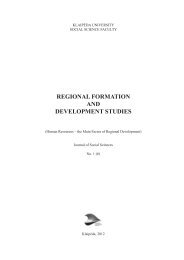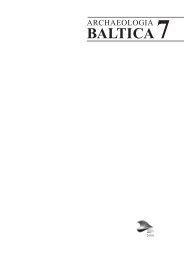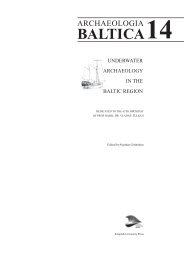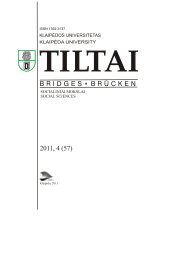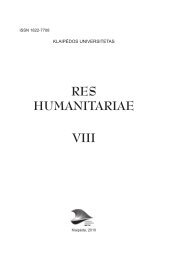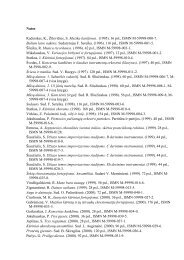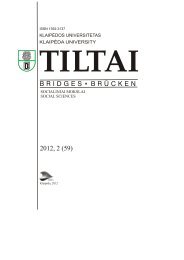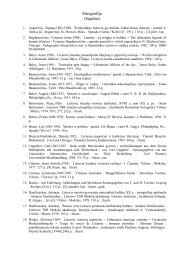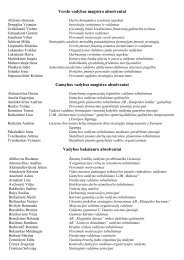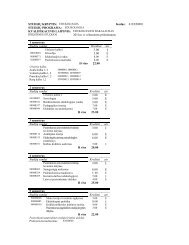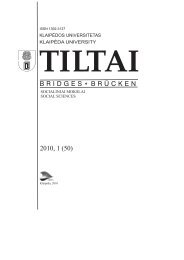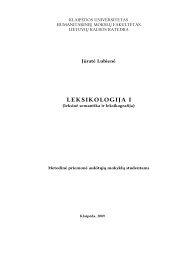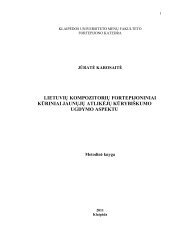BALTICA10
BALTICA10
BALTICA10
You also want an ePaper? Increase the reach of your titles
YUMPU automatically turns print PDFs into web optimized ePapers that Google loves.
L’ABBÉ JEAN LEBEUF, (1687-1760),<br />
A FORGOTTEN PRECURSOR OF<br />
ARCHAEOASTRONOMY<br />
AND ETHNOASTRONOMY<br />
ARNOLD LEBEUF<br />
Abstract<br />
Abbé Jean Lebeuf<br />
Musée d’Auxerres<br />
In the eighteenth century, the Abbé Lebeuf was a reknowned historian, a folklorist, a musicologist, and an archaeologist. He<br />
published several books and many articles in the Mercure de France. He was still famous in the 19 th century but is now almost<br />
forgotten. His work contains a great many notes, reflections and other pieces of information of interest to those studying astronomy<br />
in culture. I present here a short selection of such fragments.<br />
Key words: history, astronomy, folklore, Middle Ages, archaeology, nepotism.<br />
ARCHAEOLOGIA BALTICA 10<br />
A Short Introduction<br />
Those of our friends and colleagues who were present<br />
at the last joint SEAC-Oxford conference at La Laguna<br />
in the Canaries in 1999 may remember my mentioning<br />
the Abbé Lebeuf during my review on calendars. I recalled<br />
Lebeuf describing how a statue marked the spot<br />
where some treasure was buried by casting a shadow at<br />
sunrise on the date mentioned on its base. And the way<br />
a gentleman chose the date of St Michael for a duel<br />
with swords to resolve a conflict with the King of Cyprus.<br />
(St Michael, carrying the scales of justice and the<br />
sword of punishment at the September equinox, when<br />
day and night are in good balance, is of course the herald<br />
of divine justice in the calendar: the Saint knocks<br />
down evil Lucifer from heaven.) Another fragment<br />
contained a discussion about the orientations of tombs<br />
as a means of establishing the nation that dug them.<br />
Some colleagues suspected it was all a figment of my<br />
imagination and that the Abbé Lebeuf had never existed.<br />
Others thought it was just a crazy joke. But the<br />
Abbé Lebeuf did really exist: it is just that the memory<br />
of his works faded away and he is now almost forgotten.<br />
Once I was looking for one of his books in the University<br />
library in Warsaw. I filled in the order form and<br />
handed it to the lady at the desk. She saw the reader’s<br />
name, mine, then looked at the author’s name and the<br />
publication date, 1739, then looked back at me suspiciously.<br />
When she brought the volume it was an old<br />
book covered in leather, in a perfect state of conservation<br />
as if it had just been delivered from the printers. I<br />
took it to my table and, after a minute, returned to the<br />
desk and asked the lady to lend me a knife to separate<br />
the pages. The book had been waiting for 260 years<br />
untouched, waiting for another Lebeuf to appear and<br />
open it. Then I decided something must be done to save<br />
the old man from a shameful oblivion.<br />
A Succinct Biography<br />
Jean Lebeuf was born in Auxerres on the 6 th of March<br />
1687. Of the fortune of their ancestors his parents had<br />
only saved honor and honesty, they had two sons. Jean<br />
who was the older was soon noticed for his grave and<br />
serious interests, and his extraordinary love for study.<br />
At the age of seven, he started his humanities at the<br />
Jesuit’s college and took the clerical dress. The church<br />
was poor and still using old books of the XIIIth and<br />
XIVth centuries, in which Lebeuf learned to decipher<br />
gothic scripts and old style musical notations. This is<br />
here we find the origin of his passion for ancient manuscripts<br />
and music.<br />
Overpowered by the desire to proceed in science, he<br />
wished to go and complete his instruction in Paris. But<br />
the extreme mediocrity of his father’s fortune could not<br />
allow him for such a sacrifice. A generous uncle (who<br />
was then the secretary of the King) offered to help him.<br />
He studied theology, latin, greek, hebrew and spent all<br />
his free time at libraries. He made such a progress in<br />
paleography, a new science then, that he soon was able<br />
to determinate with certainty the age of a manuscript<br />
at first glance.<br />
He was first also to establish the age of architectural<br />
monuments by the style of their construction, the design<br />
and proportions of their vaults, one of the first<br />
as well to investigate archaeological discoveries and<br />
compare them to historical evidences. He was showing<br />
interest for the history of ideas, customs, laws, and<br />
IV<br />
IV. ASTRO-<br />
NOMICAL AND<br />
COSMOLOGICAL<br />
KNOWLEDGE<br />
IN HISTORICAL<br />
SOURCES AND<br />
LITERATURE<br />
119



